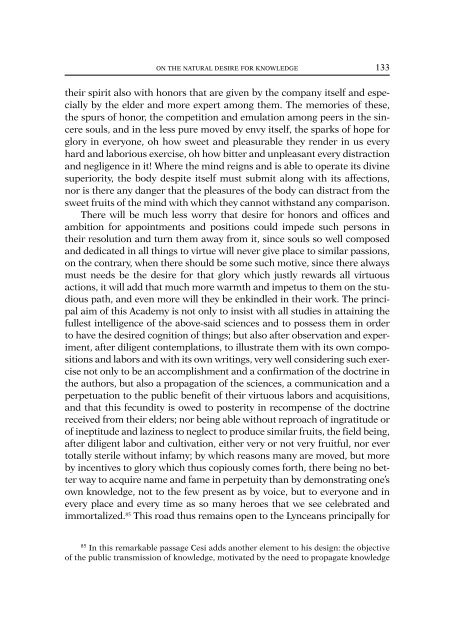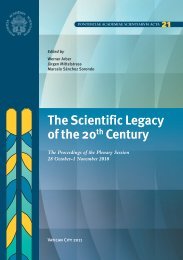Il natural desiderio di sapere - Pontifical Academy of Sciences
Il natural desiderio di sapere - Pontifical Academy of Sciences
Il natural desiderio di sapere - Pontifical Academy of Sciences
You also want an ePaper? Increase the reach of your titles
YUMPU automatically turns print PDFs into web optimized ePapers that Google loves.
ON THE NATURAL DESIRE FOR KNOWLEDGE 133their spirit also with honors that are given by the company itself and especiallyby the elder and more expert among them. The memories <strong>of</strong> these,the spurs <strong>of</strong> honor, the competition and emulation among peers in the sinceresouls, and in the less pure moved by envy itself, the sparks <strong>of</strong> hope forglory in everyone, oh how sweet and pleasurable they render in us everyhard and laborious exercise, oh how bitter and unpleasant every <strong>di</strong>stractionand negligence in it! Where the mind reigns and is able to operate its <strong>di</strong>vinesuperiority, the body despite itself must submit along with its affections,nor is there any danger that the pleasures <strong>of</strong> the body can <strong>di</strong>stract from thesweet fruits <strong>of</strong> the mind with which they cannot withstand any comparison.There will be much less worry that desire for honors and <strong>of</strong>fices andambition for appointments and positions could impede such persons intheir resolution and turn them away from it, since souls so well composedand de<strong>di</strong>cated in all things to virtue will never give place to similar passions,on the contrary, when there should be some such motive, since there alwaysmust needs be the desire for that glory which justly rewards all virtuousactions, it will add that much more warmth and impetus to them on the stu<strong>di</strong>ouspath, and even more will they be enkindled in their work. The principalaim <strong>of</strong> this <strong>Academy</strong> is not only to insist with all stu<strong>di</strong>es in attaining thefullest intelligence <strong>of</strong> the above-said sciences and to possess them in orderto have the desired cognition <strong>of</strong> things; but also after observation and experiment,after <strong>di</strong>ligent contemplations, to illustrate them with its own compositionsand labors and with its own writings, very well considering such exercisenot only to be an accomplishment and a confirmation <strong>of</strong> the doctrine inthe authors, but also a propagation <strong>of</strong> the sciences, a communication and aperpetuation to the public benefit <strong>of</strong> their virtuous labors and acquisitions,and that this fecun<strong>di</strong>ty is owed to posterity in recompense <strong>of</strong> the doctrinereceived from their elders; nor being able without reproach <strong>of</strong> ingratitude or<strong>of</strong> ineptitude and laziness to neglect to produce similar fruits, the field being,after <strong>di</strong>ligent labor and cultivation, either very or not very fruitful, nor evertotally sterile without infamy; by which reasons many are moved, but moreby incentives to glory which thus copiously comes forth, there being no betterway to acquire name and fame in perpetuity than by demonstrating one’sown knowledge, not to the few present as by voice, but to everyone and inevery place and every time as so many heroes that we see celebrated an<strong>di</strong>mmortalized. 85 This road thus remains open to the Lynceans principally for85 In this remarkable passage Cesi adds another element to his design: the objective<strong>of</strong> the public transmission <strong>of</strong> knowledge, motivated by the need to propagate knowledge
















